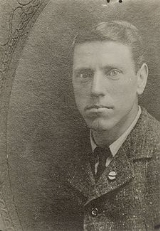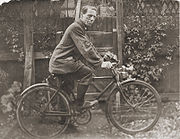
Jack Fitzgerald
Encyclopedia

Socialist Party of Great Britain
The Socialist Party of Great Britain , is a small Marxist political party within the impossibilist tradition. It is best known for its advocacy of using the ballot box for revolutionary purposes; opposition to reformism; and its early adoption of the theory of state capitalism to describe the...
.
“Fitz”, as he was known, was a very well known indoor and outdoor speaker for Party—two of his debates were issued as pamphlets: The Socialist Party and the Liberal Party (1911) and Socialism and Tariff Reform (1912)—and was a prolific writer for the Socialist Standard
Socialist Standard
The Socialist Standard is a monthly socialist magazine published without interruption since 1904 by the Socialist Party of Great Britain. The magazine is written in a simple, direct style and focuses mainly on socialist advocacy and Marxian analysis of current events, particularly those affecting...
. He was an SPGB Executive Committee member continuously from 1905 until his death in 1929 and was also on the Editorial Committee for most of that time. He was also secretary of Clerkenwell
Clerkenwell
Clerkenwell is an area of central London in the London Borough of Islington. From 1900 to 1965 it was part of the Metropolitan Borough of Finsbury. The well after which it was named was rediscovered in 1924. The watchmaking and watch repairing trades were once of great importance...
branch from 1905 to 1906.
By trade he was a bricklayer
Bricklayer
A bricklayer or mason is a craftsman who lays bricks to construct brickwork. The term also refers to personnel who use blocks to construct blockwork walls and other forms of masonry. In British and Australian English, a bricklayer is colloquially known as a "brickie".The training of a trade in...
(as were George Hicks
George Hicks
Ernest George Hicks was a British trades unionist and Labour Party politician.Hicks was born in 1879 in Venham Dean, Hampshire. Along with fellow bricklayers Jack Fitzgerald and F. K. Cadman, he was one of the founding members of the Socialist Party of Great Britain in June 1904...
and F. K. Cadman
F. K. Cadman
F. K. Cadman was a founder member of the Socialist Party of Great Britain.Cadman left the Party early on but rejoined on 14 December 1908. He was Battersea branch secretary from 1911 to 1913. Cadman was still a member in the early 1920s and is mentioned with Jack Fitzgerald in Harry Wicks’s Keeping...
) and after 1913 was on the teaching staff at the LCC School of Building at Brixton
Brixton
Brixton is a district in the London Borough of Lambeth in south London, England. It is south south-east of Charing Cross. The area is identified in the London Plan as one of 35 major centres in Greater London....
. He was an active trade unionist (Operative Bricklayers' Society
Operative Bricklayers' Society
The Operative Bricklayers' Society was a British New Model Trade Union based in London.The society was founded in 1818 as the London Bricklayers' Society, but by 1829 had developed into a national operative union. By the 1840s the union had about 1,400 members, roughly 2% of the total number of...
) and a cyclist, designing and building his own bicycles. Fitzgerald had been active in the Social Democratic Federation
Social Democratic Federation
The Social Democratic Federation was established as Britain's first organised socialist political party by H. M. Hyndman, and had its first meeting on June 7, 1881. Those joining the SDF included William Morris, George Lansbury and Eleanor Marx. However, Friedrich Engels, Karl Marx's long-term...
from around the turn of the century, being a public speaker and a delegate to SDF Conferences in 1901 (Central branch) and 1902 (Burnbank
Burnbank
-Location & governance:Burnbank, previously an independent settlement, then part of Hamilton Burgh and then Hamilton District is now a district of Hamilton within the South Lanarkshire Unitary Council...
). Along with Horace Hawkins
Horace Hawkins
Horace J. Hawkins was a British socialist.Hawkins was secretary of the Stratford branch of the Social Democratic Federation from 1900 to 1903 and a speaker for that party...
he was expelled by the SDF at its 1904 Conference at Burnley
Burnley
Burnley is a market town in the Burnley borough of Lancashire, England, with a population of around 73,500. It lies north of Manchester and east of Preston, at the confluence of the River Calder and River Brun....
, an action which led to the formation of the Socialist Party of Great Britain
Socialist Party of Great Britain
The Socialist Party of Great Britain , is a small Marxist political party within the impossibilist tradition. It is best known for its advocacy of using the ballot box for revolutionary purposes; opposition to reformism; and its early adoption of the theory of state capitalism to describe the...
. This was chiefly as a result of his unauthorised economics classes, which were continued under SPGB auspices. He was a member of the Provisional Committee of May 1904.
Harry Wicks
Harry Wicks
Harry Wicks was a British socialist activist.-Biography:Born in Battersea, London, he went to work on the railways and joined the National Union of Railwaymen in 1919. He joined the Labour Party, but after Black Friday moved to the Communist Party of Great Britain . After studying with A. E. E...
described Fitzgerald in his book Keeping My Head:
…fearless in debate, he was so confident in his own party case that he would take on anyone, be they small fry or big cheese. His style as debater was to treat his opponent, from whatever party—ToryConservative Party (UK)The Conservative Party, formally the Conservative and Unionist Party, is a centre-right political party in the United Kingdom that adheres to the philosophies of conservatism and British unionism. It is the largest political party in the UK, and is currently the largest single party in the House...
, LiberalLiberal Party (UK)The Liberal Party was one of the two major political parties of the United Kingdom during the 19th and early 20th centuries. It was a third party of negligible importance throughout the latter half of the 20th Century, before merging with the Social Democratic Party in 1988 to form the present day...
, LabourLabour Party (UK)The Labour Party is a centre-left democratic socialist party in the United Kingdom. It surpassed the Liberal Party in general elections during the early 1920s, forming minority governments under Ramsay MacDonald in 1924 and 1929-1931. The party was in a wartime coalition from 1940 to 1945, after...
, ILP or CommunistCommunist Party of Great BritainThe Communist Party of Great Britain was the largest communist party in Great Britain, although it never became a mass party like those in France and Italy. It existed from 1920 to 1991.-Formation:...
—as the exponent of the policy of their party. He invariably knew more about the programme and published material of his opponents’ party than did his actual adversary. To get to grips, not with a brilliant speech but with the written word, was his method, the apt quotation to clinch an argument. If challenged, he would dive into his trunk of books to produce the evidence. His audience loved it.
Fitzgerald died of kidney disease on 16 April 1929, aged 56.

